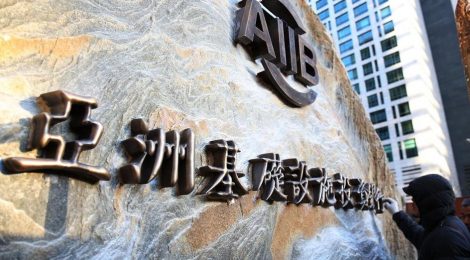
AIIB membership is growing amid concerns on China’s global ambitions
Countries from the five continents are joining the China-led Asia Infrastructure Investment Bank (AIIB), which currently has 77 member nations, and expects to reach 85 by the end of the year, its president Jin Liqun said. The AIIB is meant to fund infrastructural projects crossing the Asia-Pacific region, including much needed roads connecting Central Asia developing economies.
Since the start of operations, in January 2016, many counties have lined up to gain membership to what is viewed as a rival to the Western dominated World Bank and Asian Development Bank, led respectively by the US and Japan, two notable absentees in the AIIB. The US has been trying to discourage other advanced economies from joining the AIIB, stating that China should invest its money in existing institutions; but many European US allies, including Italy, Britain and Germany quickly signed up regardless.
The AIIB initiative, also in line with New Silk Road project, is aimed at increasing China’s presence in the infrastructure market, mainly dominated by Europeans, and at developing industrial and financial cooperation, therefore playing a greater role in international lending institutions too. These synergic initiatives are often viewed as part of China’s grand strategy to enhance its regional and global power. It might soon be clear if Beijing proves able and willing to maneuver the bank towards projects to fulfill its own geo-economic interests.
Given the recent expansion with the newly added 13 members, it seems the bank’s trajectory continues upward. China holds a 28 percent stake in it, followed by India with eight percent, which put China in the position of exercising a de facto veto over funding decisions, given that a majority of three-quarters votes is required for important decisions, such as changing the bank’s governing rules and approving major funding projects. However, an expanding membership will likely push Beijing to give up some its existing shares.

The AIIB has so far bankrolled a number of different projects, including a high-way in Pakistan, a power plant in Myanmar, and a deep-water port in Oman. The bank shareholders have pledges to raise the total capital to the equivalent of €8 billion, to €18 billion in five year-time. This contrasts sharply with the recent World Bank budget cut of $650 million proposed by the Trump administration, which seems not to be interested in maintaining US influence on global affairs, therefore leaving room for initiatives like the AIIB to play a stronger role in shaping international order.
According to AIIB’s vice president Thierry de Longuemar, the AIIB would adhere to the kind of environmental rules guiding investments of the Western-dominated institutions. He also added that: “China has a higher interest in the success of this institution. But to say that this is a Chinese bank rather than an international bank would be a big exaggeration.” Critics had feared the bank would set low standards for projects and undermine principles adhered to by the World Bank and other multilateral development finance institutions. But de Longuemar said the AIIB had a set of principles on financing projects, ensuring they are financially viable and that they follow social and environmental rules. “There are things it won’t finance, like coal-fired power plants,” he said.
It is still unclear whether the United States and Japan will alter their perspectives on the bank. The Obama administration did not join the AIIB stating that its standards on the environment and labour would be lower than the World Bank and Asian Development Bank. Japan, similarly, chose not to join the AIIB for similar reasons, but may reconsider soon.




